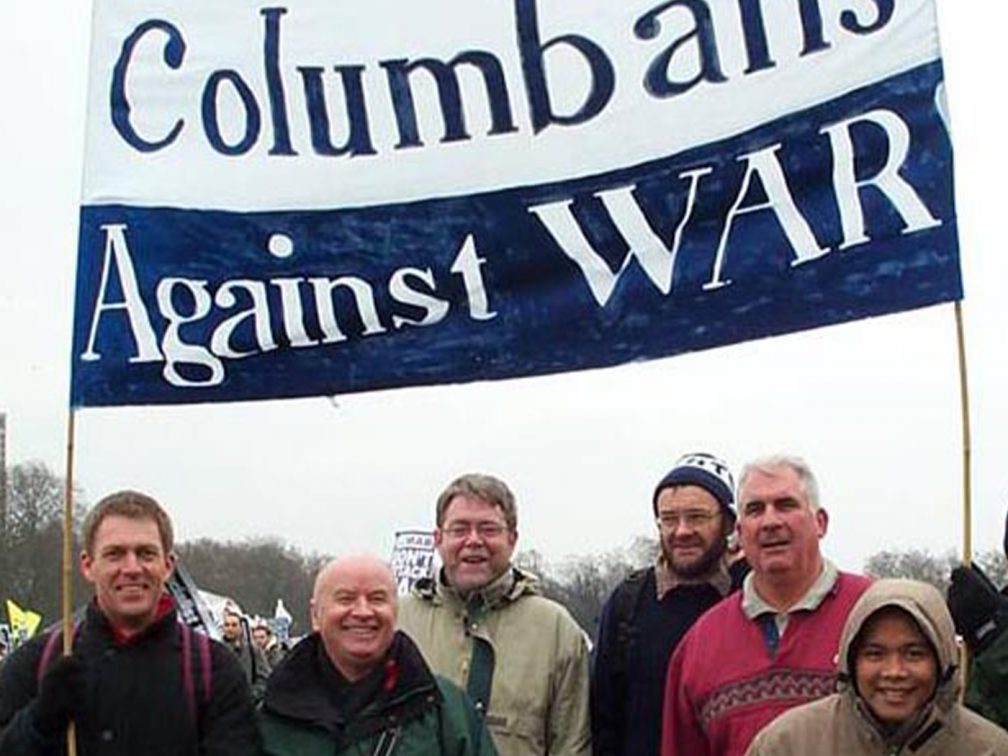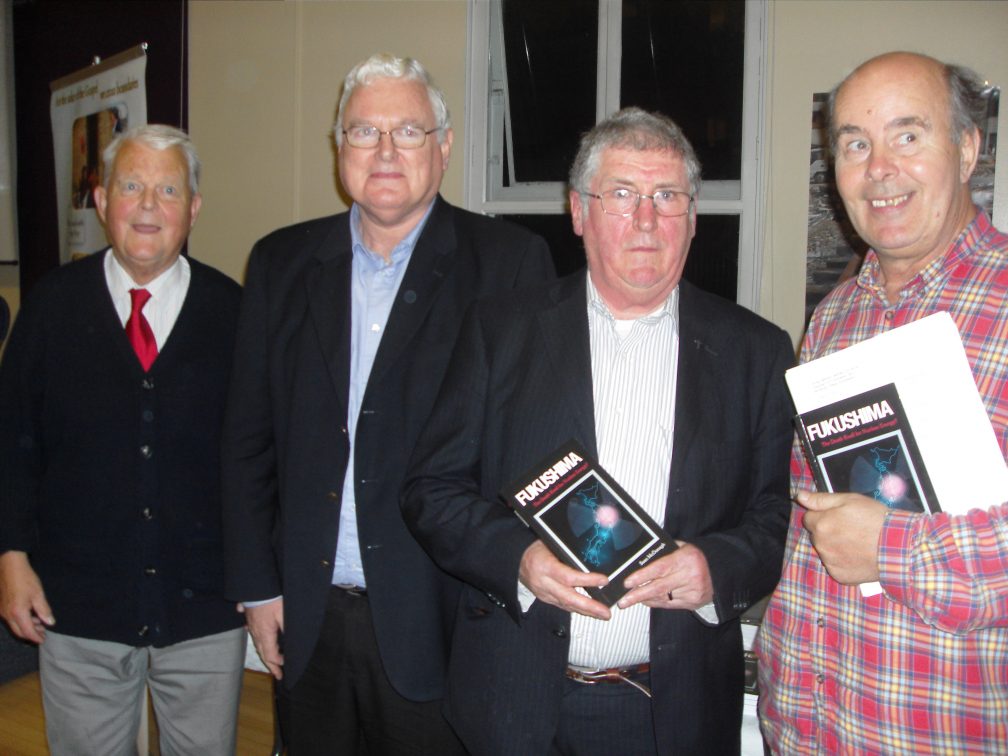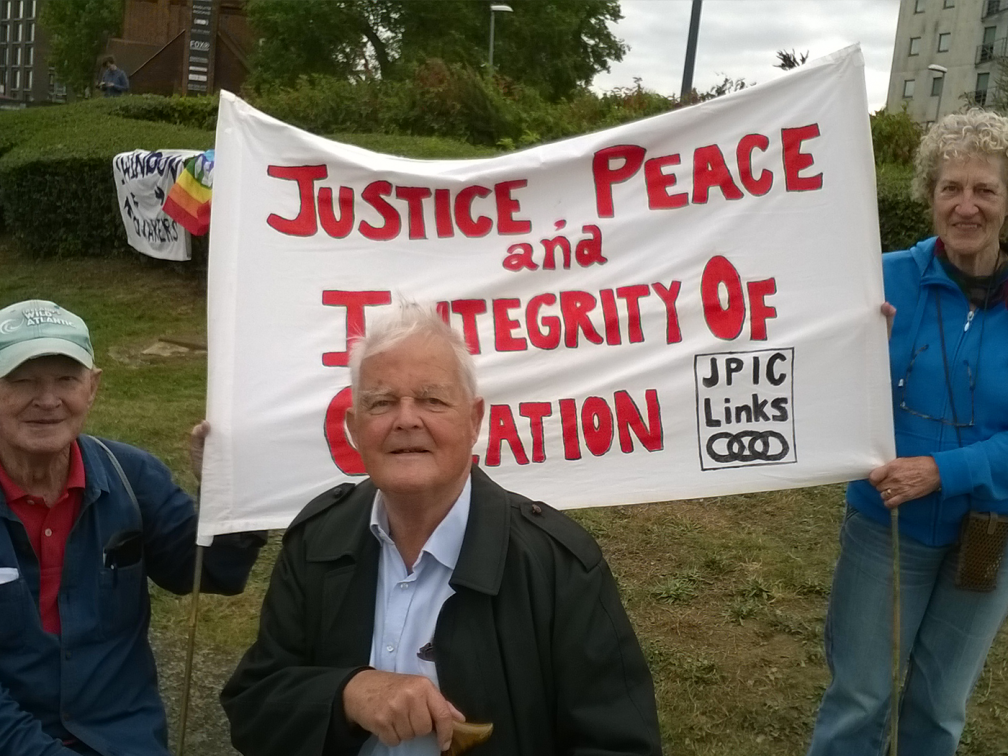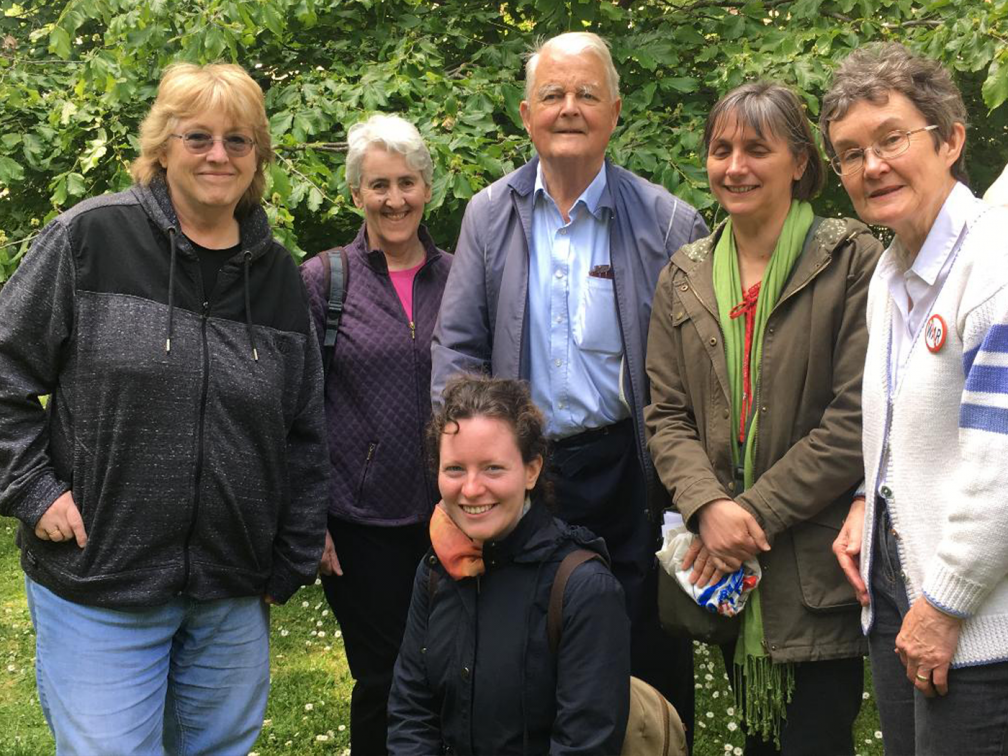His words at Pax Christi AGMs, Justice and Peace events, protests at places from Trafalgar Square to Faslane and literally thousands of events over the years will continue to inspire the millions who heard him speak live. Indeed, many talks and interviews can be accessed on the internet. He reached one million people at just one event – the Hyde Park march and rally in London against the Iraq War on 15 February 2003. “Wave your banners” he said, “what a beautiful sight you are” and one of these was a Columban banner, carried by Columban priests and lay missionaries and saying, ‘Columbans against War.’
Columbans are members of Pax Christi International and often joined Bruce, and his wife, Valerie Flessati at peace events. They were great friends of Fr Aodh O’Halpin, who died earlier this year, and they would often be together at demonstrations against arms trading.
Bruce’s last blog for the National Justice and Peace Network called for Catholics to support the Peace agenda of Pope Francis – eight years younger than himself. And in it he deplored that at COP26, the recent UN meeting on Climate Change held in Glasgow, the massive contribution to CO2 output by the world’s military hardly got a mention despite all the efforts of peace activists outside the official meeting. Columbans would agree with that.
The most prominent Catholic peace activist in Britain for more than half a century, Bruce Kent served in management of the Campaign for Nuclear Disarmament (CND), the International Peace Bureau, the Movement for the Abolition of War, as well as Pax Christi, the Catholic Movement for Peace. He has been vice president of both CND and Pax Christi UK.
Bruce was first introduced to the Catholic peace movement in the 1960s. He had met and greatly admired US Archbishop Thomas Roberts SJ at that time, who played a significant role in promoting recognition of conscientious objection to war, using the example of Franz Jägerstätter, an Austrian Catholic who was beheaded in 1943 for his refusal to serve in Hitler’s army. People like Jägerstätter, Roberts argued, should know they have the clear support of Church teaching. He also took the view that nuclear weapons involve immoral actions: the destruction of innocent people and a willingness to perform such acts in given circumstances. Every year, the Columbans have been represented at the annual Jägerstätter service at Westminster Cathedral, which also coincides with Hiroshima and Nagasaki commemorations.
In the 1970s Bruce was inspired by the great encyclical Peace on Earth in 1963 and in 1971 by the “remarkable” document on the Church and Justice produced by the Bishops’ Synod in Rome. Called Our World and You it focused on poverty, peace, education for justice and the Church’s duty to practice what it preaches. In 1980 he became the General Secretary of the Campaign for Nuclear Disarmament, at a time when Britain announced it would be hosting American cruise missiles and build new Trident nuclear submarines with American missiles and British warheads. Membership of CND mushroomed throughout the 1980s. Bruce spoke at huge rallies, wrote articles, did interviews, debates, and visited local groups.
In February 1987 he took the decision to retire from active ministry as a priest, saying, “I no longer find it possible to cope with the strain resulting from the tension between my pastoral role which means so much to me and what is thought to be an unacceptable political role”. In the 30 years since that time Bruce has continued his peace activism. Since 1988, his wife and peace activist Valerie Flessati has been by his side.
Bruce felt an affinity with all peacemakers and all would testify to his generosity and kindness in affirming others. The National Justice and Peace Network has called him a “modern prophet” and praised him for understanding, “that all justice issues are connected, although his own focus was on ending war and building a culture of peace”. He was behind the DVD, Conflict and Climate Change, produced in 2009, in liaison with the Columbans and Kevin Mayhew, which made links between militarism and human-induced global warming.
Bruce was an outspoken opponent of the British Government planning to spend more than £200 million on building and maintaining another generation of nuclear weapons to replace Britain’s current Trident system. He felt it makes nonsense of any British commitment to rid ourselves and the world of nuclear weapons. “If you have these weapons, you intend to use them” he would say, “and that is immoral”. He urged support of the UN Treaty on the Prohibition of Nuclear Weapons.
Bruce educated young people about citizenship and the work of the United Nations. “I go into schools of all sorts” he said, “and ignorance of the good work of United Nations and of its sub agencies, of the International Court of Justice, or the International Criminal Court is massive”. It grieved him that, “the miracle which brought the UN to life in on 26th June 1945 remains so small a priority in the Church, and in public life generally”. In his speech at Coventry University last November, where he was awarded an Honorary Doctorate, he urged the student audience: “Please think for yourselves. Don’t be swept along by whatever happens to be the propaganda of the day. Ask your own critical questions. For example, why are people risking their lives trying to cross the Channel in small boats?”
Bruce admired Pope Francis and supported his work on any action related to peace, justice, equality and the global trusteeship of our world. He felt that peace on Earth is going to depend on joined up education and campaigning on overcoming poverty, militarism and climate chaos, and that Pope Francis understands these connections. “I believe in nonviolent solutions to problems” he said and was delighted that Pope Francis chose to focus on ‘nonviolence as a political choice’ for his World Peace Day message for 1st January 2017.
Bruce engaged with groups outside church circles, wherever he found kindred spirits. In 1988 he walked 1000 miles from Warsaw to Brussels (NATO) calling for a united peaceful nuclear-free Europe. In 1999 he was British co-ordinator for the Hague Appeal for Peace, a 10,000-strong international conference in The Hague, which initiated some major campaigns (e.g. against small arms, the use of child soldiers, and to promote peace education). It was this, along with his friend, Professor Joseph Rotblat’s Nobel acceptance speech calling for an end to war itself, that inspired Bruce to establish in the UK the Movement for the Abolition of War. In 2019 the International Peace Bureau awarded Bruce the Sean MacBride Prize in recognition of his life’s work for peace and disarmament. Bruce also engaged with refugees, visited prisoners and campaigned for prison reform. He was a patron of the Palestine Solidarity Campaign.
Bruce said once, “I have always been a glass half full not half empty person and in terms of peace and social justice the Catholic glass is very much half full”. He felt it was amongst groups of visionary people such as Justice and Peace groups and Pax Christi, “that I find my own sources of life and inspiration”. He was, “a comfortable member of my own parish but it is with its Justice and Peace Group that I am really at home and of one mind.”
The media was buzzing with tributes as soon as his death was announced. From around the UK and internationally Bruce was described as “a true man of peace”, “one of the greatest peace campaigners the world has ever known” and “a great human being and a prophet”. I found particularly moving, “our society is weakened by his passing”.
Bruce’s favourite quote from Catholic Social Teaching was from Pope Paul VI’s 1967 encyclical Populorum Progressio: ‘Peace is the fruit of anxious daily care to see that each person lives in justice as God intends’. He gave faithful “anxious daily care” to his mission for peace for as long his health permitted and he will long continue to inspire.




